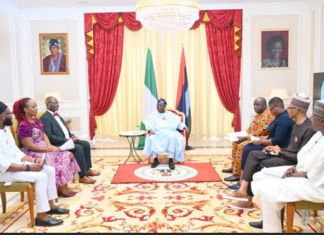On its key functions of appropriation, sound legislation and checking the excesses of the executive and judiciary, the legislature has fallen flat on its tummy. There could still be room for improvement. But so far, the National Assembly under Godwill Akpabio, does not elicit cheers.
By Emeka Alex Duru
Nigerians have with good reasons been focusing their gaze on President Bola Tinubu and the executive arm of government since May 29, 2023. It is not for nothing. The man, Tinubu came to office, preceded by hype and myths that have so far, turned out unfounded. In fact, a hoax!
Tinubu’s foot soldiers packaged and marketed him as a clinical headhunter with the talisman to turn the fortunes of the country around. But one year after, Nigerians are yet to see actions from the President. There have not been convincing flickers of hope in his Hope Renewed election mantra. Rather, the people have been fed with cocktail of propaganda and hastily contrived policies and programmes that do not have direct bearing on their lives. A colleague was right in dismissing the period as a better forgotten one year of anguish.
Tinubu deserves whatever knocks he gets for failing those that had looked up to him. His thoughtless pronouncement on the day of inauguration ending subsidy on petroleum products and subsequently, merging the foreign exchange market, without any fallback, is at the heart of the trauma Nigerians are going through. Such policy decisions are not the types to be taken for the fun of it. But that was Tinubu, the one attributed with magic wand. You can therefore understand why the citizens are aghast at the president. He has so far failed them. And they are right to be angry.
But the critical question, is where is the legislature, the National Assembly in all these? A major blow that the years of military rule dealt on the psyche of Nigerians, is the tendency to focus more on the executive, with lesser attention to the legislature and the judiciary.
READ ALSO:
Biafra Day: How not to honour the fallen heroes
The judiciary is even reckoned with more than the legislature. And that is where the missing gap lies. An elected legislature is the arm of government that defines a government as democratic. A lot lies on that arm of the government to keep the ship of state stable at all times.
Under the military or monarchy, the executive exists, ditto, the judiciary, under whatever guise. But a system can only be said to be practicing democracy when its legislature is present and alive to its responsibilities. That is why the legislators are seen as true representatives of the people. Any other contraption is an autocracy or outright dictatorship.
It is not for nothing that Section 47 of the Constitution prescribes that “there shall be a National Assembly for the Federation which shall consist of a Senate and a House of Representatives”. The National Assembly is constitutionally vested with several functions, prominent among which are lawmaking, representation, appropriation, among others.
Its powers also include ratifying treaties, investigating the executive branch, impeaching and removing from office members of the executive and judiciary, and redressing constituents’ grievances. At the states are Houses of Assembly.
The weight of responsibilities on the legislature, is thus, much. But the problem is that the legislature in Nigeria does not understand its role, nor the power it commands in putting the country on a sound footing. Consequently, the executive has exploited the naivete or lethargy of the lawmakers and has reduced the lawmaking institutions to mere appendages of the presidency or governors’ offices. From the inception of the current dispensation, the executive arm has not hidden its disdain on the legislature, going as far as selecting its principal officers.
Days to the inauguration of the present National Assembly, Tinubu had met some senators and members of the House of Representatives-elect across all parties, in Abuja where he tasked them to put the nation first and downplay party politics in the discharge of their duties. He also called on the lawmakers to work together to choose good leaders in the 10th National Assembly.
He did not voice support for any of the candidates vying for the senate or House of Representatives leadership at the meeting. But it was known that Tinubu was rooting for Godswill Akpabio, former Akwa Ibom state governor, for senate presidency and Tajudeen Abbas, as Speaker of the House. At the inauguration of the Assembly on June 13, 2023, it was not surprising that the two candidates emerged the winners.
Tinubu acted like his predecessors in choosing the NASS leadership but was more subtle. In 1999, President Olusegun Obasanjo, foisted Evans Enwerem on the senate and Salisu Buhari on the House of Representatives. Scandals of forgery and certificate manipulation, eventually saw them leaving the offices in ignominy. Obasanjo went on to ensure instability in the senate, accounting for five senate presents in quick succession.
In his first term, President Muhammadu Buhari tried having his way in selecting principal officers for the NASS, but met his match in Bukola Saraki, who outsmarted him to emerge Senate President. Yakubu Dogara equally emerged against Buhari’s choice of Femi Gbajiabiamila in the House. The emergence of Saraki and Dogara gave the National Assembly a semblance of independence in conducting their affairs.
That veneer of independence has been lost in the present NASS with Akpabio in the Senate and Abbas in the House. What we have now is a selfish legislature that hardly bothers at the disturbing drift in the land, as long as the interest of its members are taken care of. Yes, there is no doubting the fact that there could still be senators and honourable House members that can stand on their own on major national issues. But truth be told, NASS under Akpabio, has in its actions and utterances, shown to be the most timid and timorous in approaching the matters off state and governance.
Nobody is of course, nobody is asking the NASS to engage in needless confrontation with the presidency or accomplish all the tasks before it within one year. But there has to be an encouraging starting point. Maybe, the remarks of the 16th President of the United States, Abraham Lincoln, in his September 17, 1859 Speech at Cincinnati, Ohio, can serv, here. “I do not mean to say that this government is charged with the duty of redressing or preventing all the wrongs in the world; but I do think that it is charged with the duty of preventing and redressing all wrongs which are wrongs to itself”, Lincoln said.
For whatever reasons perhaps known to him, the senate president has brought the legislature very low and subservient to the president to the point that many mistake that important organ of the government as an extension of the presidency. Even the few and occasional interventions by NASS on national issues, have been met with jeers because of their ineffectual dimensions.
The first was the 2024 budget, which was riddled with controversies bordering on padding and other inconsistencies. Then, the return to the 1960 national anthem that was discarded in 1978. Akpabio and his colleagues in NASS are yet to convince us on the need for that retrogressive step other than to assuage the cravings of President Tinubu
To be fair, the lawmakers have shown some sparks in passing bills on drug trafficking, regional development commissions in some parts of the country and other issues. But on its key functions of appropriation, sound legislation and checking the excesses of the executive and judiciary, the legislature has fallen flat on its tummy. There could still be room for improvement. But so far, the National Assembly under Godswill Akpabio, does not elicit cheers.













